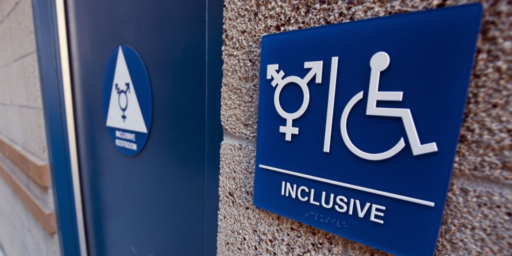I Always Feel Like Someone is Watching me
Via The Atlantic: All the Ways Your Wi-Fi Router Can Spy on You:
A system called “WiKey” presented at a conference last year could tell what keys a user was pressing on a keyboard by monitoring minute finger movements. Once trained, WiKey could recognize a sentence as it was typed with 93.5 percent accuracy—all using nothing but a commercially available router and some custom code created by the researchers.
And a group of researchers led by a Berkeley Ph.D. student presented technology at a 2014 conference that could “hear” what people were saying by analyzing the distortions and reflections in Wi-Fi signals created by their moving mouths. The system could determine which words from a list of lip-readable vocabulary were being said with 91 percent accuracy when one person was speaking, and 74 percent accuracy when three people were speaking at the same time.
[…]
I asked the lead researcher behind WiKey, Kamran Ali, whether his technology could be used to secretly steal sensitive data. Ali said the system only works in controlled environments, and with rigorous training. “So, it is not a big privacy concern for now, no worries there,” wrote Ali, a Ph.D. student at Michigan State University, in an email.






It’s also possible to compromise a mobile phone, then get a pretty accurate grab of what’s typed on a keyboard–not the phone’s keyboard, but the keyboard sitting on the desk next to the phone. Each combination of keystrokes vibrates the desk a little differently, you see, and the phone’s accelerometer picks up the vibrations…
https://www.wired.com/2011/10/iphone-keylogger-spying/
A point I’ve been trying to make since Snowden blew up the privacy issue: privacy is effectively dead. Technology has killed privacy. What little remains will soon be gone.
The fact that WikiLeaks stories are reported shows that the media (and society at large) are on-board with invasions of privacy. Society is already beginning to adjust, accepting easily what had once been unthinkable.
Laws will be powerless. We are each left to erect what barriers we can, but the simple reality is that if anyone cares enough to look, they can eventually see.
I’m just going to assume that DARPA, NSA, etc are all miles ahead of what can be done with WiKey.
@PJ: That is a very safe assumption. The stuff we’re hearing about is decades behind..
@PJ: @Matt: I’m not so sure. These methods are very difficult to implement in actual practice, where conditions vary greatly and never approach the ideals of the lab environment. I’ve looked over the “WiKey” paper and there are several pre-conditions that would be challenging to achieve with a real-world target.
Actual in-practice surveillance tends to use less esoteric methods that have been in use for a while and have had success. Spycraft like “WiKey” (or even the mobile phone accelerometer exploit I linked to) is really cool and all, but it’s better-suited for Hollywood than for actual information gathering.
@Matt: @PJ: If the government had this stuff working, beyond the ridiculous contrived situation phase, don’t you think they would be using it? Don’t you think they would have have stopped more of the recent terrorists?
Unless we just don’t hear about their successes — they have to hide the mechanisms of their success after all…
https://www.youtube.com/watch?v=7YvAYIJSSZY
@Surreal American: Exactly.
@Gustopher: There are over 300 million people in this country alone. There’s another 6.7 BILLION people outside of the USA.
Do you have any experience with extremely large databases? Sometimes you have so much data that you cannot even really make sense of it. The NSA is STILL having issues with that problem.
There will ALWAYS be failures but that doesn’t mean there are never any successes…
@Gustopher: They hide their advances all the time. Just look at Area 51 and the Montauk project. Even Congress and the president are not aware of the existence of a lot of secret projects and agencies.
We have a sense of entitlement to privacy on the internet, and assume (insert the old joke here) that to be possible. I wonder sometimes though…will it will pan out to be essentially a gargantuan bulletin board?